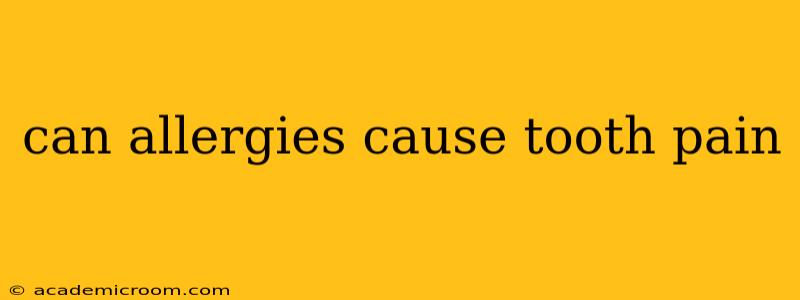Experiencing tooth pain can be incredibly disruptive, leading to discomfort and impacting daily life. While many associate toothaches with cavities or gum disease, the cause might sometimes be surprisingly unexpected—allergies. While not a direct cause in the way a cavity is, certain allergic reactions can trigger symptoms that manifest as tooth pain. This article delves into the potential link between allergies and tooth pain, exploring the mechanisms and providing clarity on this often overlooked connection.
How Can Allergies Lead to Tooth Pain?
Allergies don't directly attack your teeth. Instead, the pain arises indirectly through several pathways:
-
Sinus Infection: Many allergies, particularly seasonal allergies (hay fever), can lead to inflammation of the sinuses. The sinuses are located very close to the upper teeth, and when inflamed, the pressure and pain can radiate into your teeth, mimicking a toothache. This is especially true in the upper molars.
-
Medication Side Effects: Some allergy medications, like antihistamines, can have dry mouth as a side effect. Dry mouth reduces saliva production, which is crucial for protecting teeth and neutralizing acids. Reduced saliva can increase the sensitivity of your teeth, leading to pain when consuming hot, cold, or sweet foods.
-
Referred Pain: Nerve pathways in the face are complex. Pain from one area can sometimes be felt in another. For example, severe sinus pain from allergies might be misinterpreted as tooth pain, especially in the upper jaw.
-
Dental Abscess Exacerbated by Allergies: While not directly caused by allergies, existing dental problems like an abscess might be exacerbated by an allergic reaction. The inflammation associated with an allergy could worsen an existing infection, increasing tooth pain.
Can Food Allergies Cause Tooth Pain?
While less common than sinus-related allergy pain, some food allergies can indirectly cause tooth pain. Severe allergic reactions can cause swelling in the mouth and face, potentially affecting the teeth and gums. Furthermore, certain food sensitivities might lead to inflammation and discomfort in the mouth that could be perceived as tooth pain.
What Other Symptoms Might Accompany Tooth Pain from Allergies?
Distinguishing between a true toothache and pain stemming from allergies is crucial for proper diagnosis and treatment. Pay attention to accompanying symptoms:
- Runny nose and sneezing: Classic allergy symptoms.
- Congestion and pressure in the sinuses: A key indicator of sinus inflammation.
- Itchy or watery eyes: Another common allergy symptom.
- Facial Swelling: This can indicate a more severe allergic reaction.
- Dry mouth: A common side effect of some allergy medications.
How Can I Tell If My Tooth Pain Is Allergy-Related?
Determining if your tooth pain is allergy-related requires careful consideration of your symptoms. If you also experience classic allergy symptoms like those listed above, it's more likely that the tooth pain is referred pain from sinus inflammation. However, it's crucial to consult a dentist to rule out any underlying dental issues. A dentist can perform a thorough examination to assess the condition of your teeth and determine the cause of your pain.
When Should I See a Dentist?
It's always best to err on the side of caution. If you're experiencing persistent tooth pain, regardless of the suspected cause, you should schedule an appointment with your dentist. They can diagnose the problem accurately and recommend the appropriate treatment. Don't attempt to self-diagnose or self-treat tooth pain.
Disclaimer:
This article is for informational purposes only and does not constitute medical advice. Always consult with a qualified healthcare professional or dentist for any health concerns or before making any decisions related to your health or treatment.
